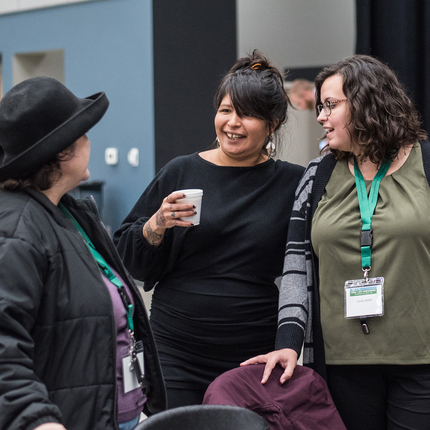Justin Carter contributed to this blog.
Small food and arts-based businesses were offered tools needed to be successful in growing their businesses at the first-ever Food + Art Conference in Pender, Nebraska. The event was hosted by the Center for Rural Affairs in October.
In the heart of rural America, attendees were able to gain access to resources usually only found at larger conferences in urban areas.
Nine breakout sessions were offered, covering the topics of funding, small business basics, food hubs, how to market and sell your art, developing cooperatives, and community development around local foods and the arts.
Also available to attendees were free consultations with Center for Rural Affairs loan specialists.
Sandra Renner, farm and community director at the Center, felt the conference offered attendees a chance to expand their business knowledge through networking.
“Conversations about the emerging market opportunities for both businesses and communities are taking place, though not as widely in rural communities in northeast Nebraska,” she said. “This conference gave us a chance to start a real dialogue.”
Fifty-five conference participants mingled and networked in the exhibitor area with potential funders, such as the Center and the U.S. Department of Agriculture Rural Development.
While exploring the exhibitor area, attendees could also view a small art showcase from artist Jennifer White, owner and artist at Post Pilgrim Gallery, as well as check out a food demonstration that included Jordan Feyerherm, project associate with the Center, making smoothies using an innovative blender bike—a blender powered by pedaling a bicycle.
“We were tasked with getting multiple audiences under one roof for one day—food based businesses, arts based businesses, community or economic developers, and those who could provide funding or opportunities,” said Sandra. “We were very successful in attracting the right audience to the conference where conversations could be had about building strategies around local foods and the arts.”
Also featured during the conference was keynote speaker Michael Fortunato, of Creative Insight Community Development. In his work, Michael consults and specializes in innovative approaches to developing food hubs, business incubation and entrepreneurship, and developing creative community strategies through art and makerspaces.
The speaker shared words of wisdom with conference attendees, in addition to helping create content for and executing the breakout sessions.
“Everyone who was there had something to offer,” he said. “In the rather polarized world we live in, food and the arts are the things that bring people together, where people can meet in the middle. This conference was very community building.”
He was impressed by the natural, relaxed flow of the conference, and praised the attitude and direction it took.
“An overarching theme I noticed was putting the right things first—we saw food and arts presented as ways to get a better economy,” Michael said. “People generally think they need a better economy to have good food, but really, they need good relationships that are broad based and strategic, which then helps the economy. Most conferences are based on seeing the latest fad, but it wasn’t like that for this conference. You have to stop and ask yourself, ‘What’s the reason, why are we doing this, and what can we do right now?’ That’s what this conference was.”
Both Sandra and Michael shared the hope of seeing the conference continue in the years to come.
“I’d love to see it grow, because it didn’t feel like a traditional conference—it was more interactive, and had an informal feel with lots of networking opportunities,” said Michael. “Most innovation and new novel types of development result from being networked properly—that was a great part of the conference.”
Sandra also heard good reviews from conference attendees.
“We received a lot of positive feedback from participants who got to watch a live food demo, experience local food businesses during the breaks and lunch, hear from a variety of speakers, and go on a tour of available retail spaces right in Pender,” she said. “Attendees told us what they wanted and needed more of, and we plan to hold a workshop and three learning circles for businesses in Thurston County before next fall.”
By the numbers
- 96 percent of attendees made contacts they will use in their work.
- 95.7 percent of attendees said the conference had improved their understanding of starting a business.
- 27.3 percent said they would use what they learned to start a small business, 40.9 percent said maybe.
- Attendees noted the most helpful session was "Innovative Approaches to Developing Food Hubs," a panel discussion led by Fortunato.
- 2 other popular sessions were on small business basics and economic development through local food and the arts.




